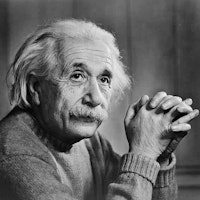A human being is part of the whole, called by us ‘universe,’ a part limited in time and space. He experiences himself, his thoughts and feelings, as something separate from the rest—a kind of optical delusion of consciousness.
Albert Einstein

Part of the Whole
Topic: Immanence & Transcendence
A human being is part of the whole, called by us ‘universe,’ a part limited in time and space. He experiences himself, his thoughts and feelings, as something separate from the rest—a kind of optical delusion of consciousness. This delusion is a kind of prison for us, restricting us to our personal desires and to affection for a few persons nearest to us. Our task must be to free ourselves from this prison by widening our circle of compassion to embrace all living creatures and the whole of nature in its beauty.
Albert Einstein, born on 14 March 1879 and passing away on 18 April 1955, stands as one of the most renowned theoretical physicists in history. Best known for his groundbreaking special and general theories of relativity, his scientific endeavors spanned a multitude of areas within the field of physics. Amongst his numerous accolades, he was awarded the Nobel Prize in physics for his elucidation of the photoelectric effect—a phenomenon that expanded the horizons of quantum theory.
Einstein's journey, however, wasn't merely defined by scientific discoveries, but by the myriad challenges he overcame across various dimensions of his life. In his spiritual journey, he grappled with the concepts of God and universe. Socially, he navigated the complexities of his time—facing the rise of anti-Semitism, experiencing exile from his homeland due to Nazi oppression, and advocating for civil rights, disarmament, and global peace. These adversities only strengthened his resolve and underscored his resilience.
Beyond his professional accomplishments, Einstein's life was enriched by a tapestry of relationships and dialogues with luminaries from diverse fields. He engaged in profound conversations on the nature of reality with the likes of the Indian poet Rabindranath Tagore, discussed the principles of non-violence with Mohandas Gandhi, and deliberated on humanitarian issues with Albert Schweitzer. Furthermore, his camaraderie with fellow scientists and physicists provided a fertile ground for intellectual exchanges, fostering an environment of collaboration and innovation during one of the most exciting epochs in scientific history.
Easwaran, Eknath. Words to Live by: Short Readings of Daily Wisdom. Nilgiri Press, 2010, p. 336.

Albert Einstein
Theme: Immanence and Transcendence

About This Albert Einstein Quotation [Commentary]
Albert Einstein’s reflection on human consciousness reveals a deep insight into the interconnectedness of existence. He writes, “a human being is part of the whole, called by us ‘universe,’ a part limited in time and space,” yet this unity is obscured by what he describes as an “optical delusion of consciousness.” This sense of separateness, though central to human experience, is a construct that confines us to personal desires and narrow affections. Einstein challenges us to recognize this illusion and strive for a broader understanding of our connection to the universe.
Einstein’s critique of this delusion aligns with a universal spiritual theme: transcending self-centeredness to embrace a wider compassion. He suggests that freeing ourselves from this “prison” involves extending compassion to “all living creatures and the whole of nature in its beauty.” This call resonates with the idea of immanence, where unity is present within all life. By breaking free from the separative lens of ego, individuals can perceive the world as interconnected rather than fragmented, a shift requiring self-awareness and deliberate effort.
The transformative power of Einstein’s insight lies in its balance of immanence and transcendence. The interconnectedness he describes highlights the unity within life, while the effort to “overcome the delusion” reaches beyond the limits of self. His words encourage reflection on how our inner life and outward actions can align with this greater truth. By broadening compassion and recognizing beauty in all life, we move toward a unified existence, bridging individual experiences with the universal whole.
Naomy Levy About This Albert Einstein Quotation
Albert Einstein used a different formulation of the above featured passage in a letter to Rabbi Robert S. Marcus:
“A human being is part of the whole, called by us ‘universe,’ a part limited in time and space. He experiences himself, his thoughts and feelings, as something separate from the rest—a kind of optical delusion of consciousness. The striving to free oneself from this delusion is the one issue of true religion. Not to nourish the delusion but to try to overcome it is the way to reach the attainable measure of peace of mind.”
—Albert Einstein [Naomi Levy, Einstein and the Rabbi: Searching for the Soul, MacMillan] pp. 22-23.
Eknath Easwaran About This Albert Einstein Quotation
None of us see life as it is, the world as it is. We all see life as we are. We look at others through our own likes and dislikes, desires and interests. It is this separatist outlook that fragments life for us—man against woman, community against community, country against country. Yet the mystics of all religions assure us on the strength of their own experience, if only we throw away this fragmenting instrument of observation, we shall see all life as an indivisible whole.
—Eknath Easwaran [Words to Live By, Nilgiri Press, 2005] p. 336.
Resources
Related Quotes
Copyright © 2017 – 2025 LuminaryQuotes.com About Us